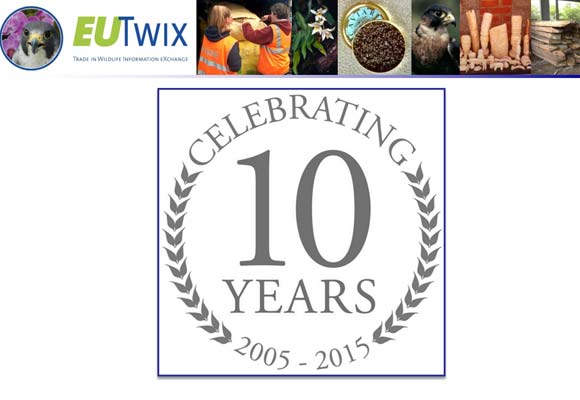EU-TWIX: ten years of enforcement assistance
Cambridge, UK, 3rd December 2015—EU-TWIX (European Union Trade in Wildlife Information eXchange), the communications platform and seizures database for European enforcement officials has just turned ten years old.

Established in 2005 as a joint initiative by the Belgian Federal Police, Belgian Convention on International Trade in Endangered Species of Wild Fauna and Flora Management Authority (CITES MA), Belgian Customs, and TRAFFIC, for a decade EU-TWIX has been facilitating the monitoring of illegal wildlife trade by providing a seizures database and platform for communication between officials across European countries.
Current members include representatives from all 28 EU Member States plus Albania, the Former Yugoslav Republic of Macedonia, Montenegro, Norway, Serbia, Switzerland, Turkey and the Ukraine.
During the past decade, the number of wildlife enforcement officials connected through EU-TWIX has risen from 150 to 840, close to a six-fold increase. They include officials from over 100 European enforcement agencies including Customs, police, environmental inspection services, CITES Management Authorities, veterinary and phytosanitary inspection services, staff from the European Commission (EC) and seven international organizations. Importantly, several prosecutors and judges are also connected, ensuring representatives along the entire enforcement chain are informed and connected.
As a result of messages exchanged via EU-TWIX, a number of investigations into potential wildlife crimes have been triggered, some of which extend well beyond Europe’s borders. For example, in 2012, the EU-TWIX network assisted authorities in the Galapagos with a court case involving a German citizen who had attempted to smuggle threatened iguanas out of the Islands. In February 2013, an Ecuadorian court sentenced the individual to four years in prison.
In 2014, at least 13 criminal investigations were initiated as a result of the 500 enforcement-related messages exchanged that year via the EU-TWIX forum. The mailing list is also used by officials to seek assistance on species identifications, enabling decisions to be taken quickly on whether shipments should be seized.
“The ability for enforcement officers to receive accurate, trusted information quickly often makes the difference in detecting wildlife crime and stopping the criminals in their tracks,” said Pol Meuleneire, GAD, Belgian Customs.
EU-TWIX also includes a database for wildlife seizures made in the region by a range of enforcement agencies. In August 2014, the landmark of 40,000 seizure records from the 28 EU Member States was reached.
Analysis of the database helps EU enforcement agencies and international organizations monitor trends in illegal trade and carry out threat assessments. As a single market, with free movement of goods and no internal border controls, it is essential to have such information on illegal wildlife trade at the overall EU level. Up to 2014, the Belgian Federal Police continued to provide in-kind support for the essential transfer of information into the database, which is managed on a daily basis by TRAFFIC.
“EU-TWIX has proven its worth in Europe over the past ten years, and the benefits of employing such a system are poised to be felt elsewhere,” said TRAFFIC’s Vinciane Sacré, manager of EU-TWIX.
EU-TWIX has been used as a model for Tigernet, an online database of records on Tiger mortality and other key wildlife species across India, established by the Indian government’s National Tiger Conservation Authority (NTCA) and TRAFFIC.
Meanwhile, the EU-TWIX model is currently being replicated in Central Africa, with a pilot project implemented in Cameroon, Democratic Republic of Congo, Congo and Gabon aimed at establishing a mailing list to enable agencies in the region to communicate among themselves as well as a database to hold seizures data for the four countries.
“With wildlife crime higher than ever on the political agenda, there has never been a more critical time to showcase the tangible benefits of implementing an effective, international platform for enforcement collaboration,” said Katalin Kecse-nagy, TRAFFIC's Acting Regional Director for Europe.
“However, long-term funding is needed to secure the future of EU-TWIX and similar systems to ensure their operation can continue to assist enforcement agencies to counteract the global trafficking of wildlife for decades to come.”
Notes:
EU-TWIX has received funding from the European Commission (DG Environment and DG Home Affairs) and the Governments of Austria, Belgium, the Czech Republic, Estonia, Finland, France, Germany, Greece, Italy, Latvia, the Netherlands, Norway, Poland, Slovakia, Spain, Switzerland and the UK. The ‘AFRICA-TWIX’ (working name) project is supported by the German Polifund project, implemented by GIZ on behalf of the German Federal Ministry for Economic Cooperation and Development (BMZ) and the German Federal Ministry for Environment, Nature Conservation, Building and Nuclear Safety (BMUB).
Illegal Wildlife Trade and the European Union: An analysis of EU-TWIX seizure data for the period 2007-2011. Victoria Mundy-Taylor. (2013). Report prepared for the European Commission.



